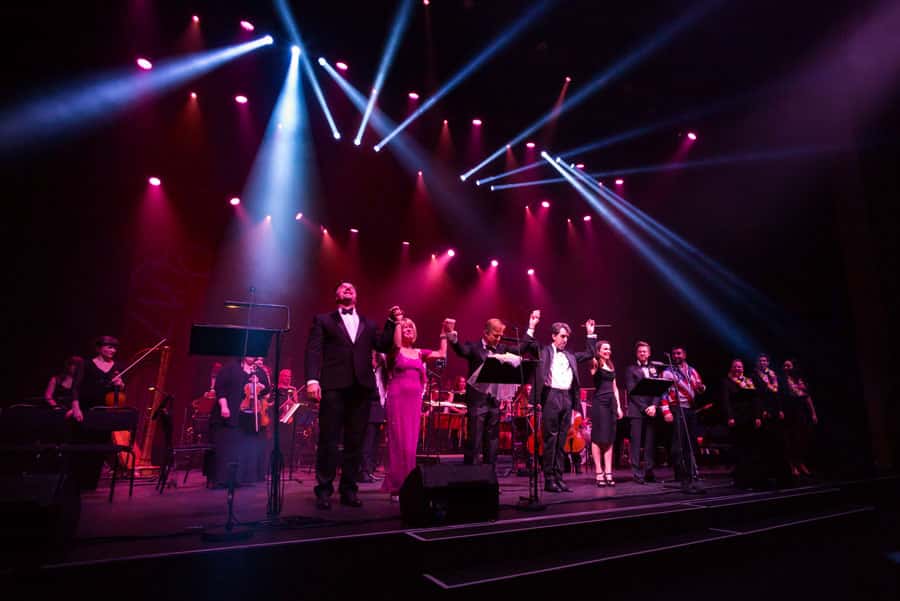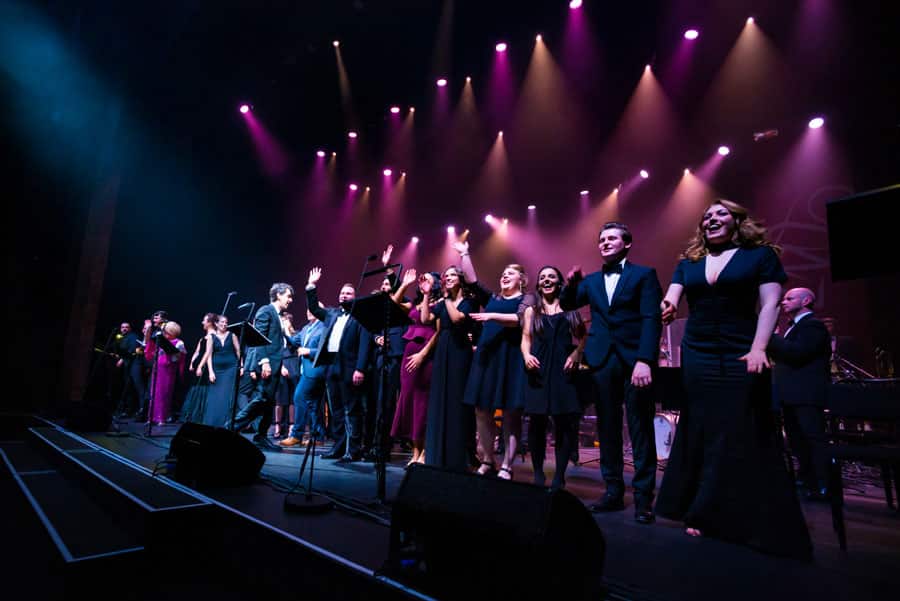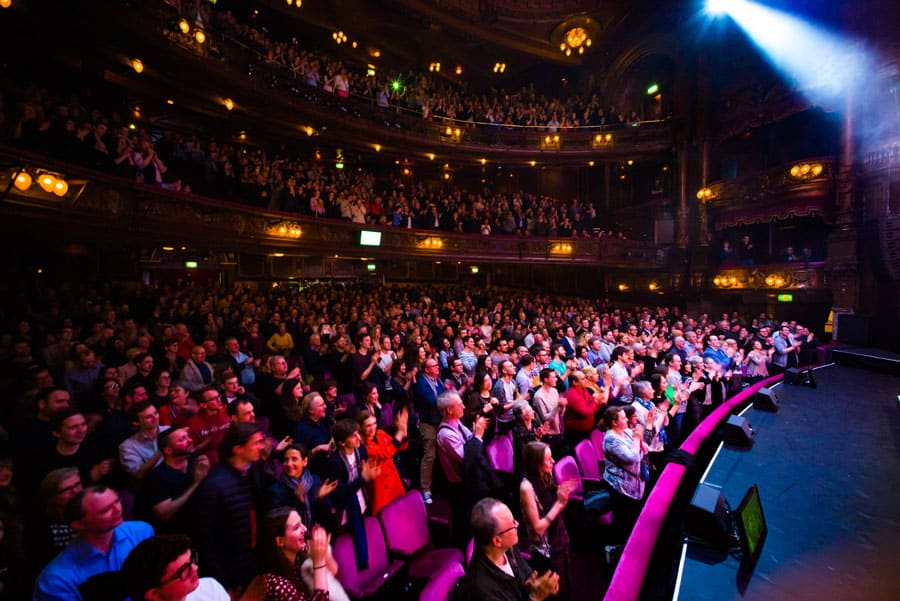
Honeymoon In Vegas
London Palladium
Sunday 12th March 2017
4 Stars
If ever an evening should have been a complete 5-star success, then this was it! Jason Robert Brown, composer and lyricist of this most wonderfully exuberant, optimistic and sexy of his scores, flew in from New York to conduct the splendid London Musical Theatre Orchestra and a stage filled with West End talent in a flawless gem of a concert performance of the whole show: its European premiere. And what better setting for such an event than Sunday evening at the magnificent Palladium, packed to the gunwales with an enthusiastic and appreciative audience.
Originally scored for 14 instruments in beautiful arrangements by a roster of Broadway greats – Don Sebesky, Larry Blank, Charlie Rosen and JRB himself – Simon Nathan, ably assisted by Tom Kelly, has expertly expanded their work into the 30 parts of the LMTO band, preserving all the fine detail of the Broadway version, and brilliantly balancing the heavier forces on hand to give them truly magisterial effect. JRB conducted the results with obvious relish, clearly adoring the power and precision of the magical musical machine at his disposal, and inspiring them to deliver performances at the very top of their game. Right from the first notes of the thrilling overture, this was going to be a night no one present would ever forget.

Even before any of the actors present joined in, though, we were also aware of other players in this splendid game: the miracle that was Mike Robertson’s lighting design – a sumptuous feast of changing patterns and densities – and Avgoustas Psillas’s sound design that maintained a pellucid clarity in all but the busiest moments of orchestral action.
However, when the voices kicked in, the casting of the spell was complete. Arthur Darvill, as the lead, Jack Singer, set the tone right away with his entrance number, ‘I Love Betsy’, confirming his position as one of the leading musical theatre tenors of his generation. This was smartly followed up by Rosemary Ashe’s shiningly operatic ‘Never Get Married’, as the nightmare Jewish mother from beyond the grave, returned in a flashback to haunt her timid child. And, then we made up the domestic trio with Samantha Barks’ superbly contrasted ‘Anywhere But Here’ as the intelligent and sensitive would-be spouse, Betsy. Just when we thought things couldn’t get any better, they did: Simon Lipkin blasted onto the stage and swept us up with his lounge singer’s calling card, ‘When You Say Vegas’ (and what a glory it was to hear his voice in full throttle, rising over and leading the full forces of the band, while still keeping the intimate playfulness of the lyric dancing in the air).
Then up pops the villain of the piece, Maxwell Caulfield as Mr Korman, to deliver a splendid spoof number, ‘Out of the Sun’, before launching the plot’s great obstacle in the path of the young lovers: the private poker game that will hoist hapless Jack on his own petard, apparently wrecking the chances of them finally clinching their long-deferred wedding… and, indeed, the honeymoon of the title. And with that, the exposition was complete. This far into the show, it seemed unthinkable that a work as strong as this, which debuted on Broadway as recently as 2015, should not still be playing there, or not be fighting it out with other high-profile American arrivals to get into a choice theatre in the English capital.

That’s where a concert version and a stage production differ: it was easy, deliciously easy, in the Palladium to concentrate on the musical wonders of the show, and not to pay too much attention to what was happening in the script. And this was just as well. The book, based on his original screenplay by Andrew Bergman, weaves together the strands of the story outlined above in an initially very pleasing cord. But then, one by one, Bergman lets the strands drop, till very few of them are left. To make good their absence, he reaches out to lay a hold on other strands, which – as it so happens – are already knitted into other stories. This is a little disconcerting; nevertheless, he does it with such conviction and provides such interesting complications, that we are more or less ready to go along with his new story. That quickly builds to a gripping first act finale, and we gasp at the difficulty of the problem that his script has now confected for us, and are looking forward to go out into the bar at the interval to try and work out what will happen next.
And then there is no interval. The play continues. We cannot understand why. We stagger on into what seems to be a second act. That then racks up another cliffhanger, and – while it is not so compelling as the first one – we go along with it. And when indeed the curtain does fall on the first act, we trot out into the bar wondering why we have just had two ends to the first act served up to us, and why the second was so comparatively underpowered.
Also, by the half-way mark, we don’t know whether the show is his story, or hers, or the villain’s, or the mother’s, or anybody else’s. The audience just doesn’t know whose narrative to follow or what to make of it, and this – one presumes – is more or less what did for the show when it surfaced on Broadway. Two months of previews (yes, you read that correctly) were not sufficient to draw to the attention of the team that the scriptwriter’s book just doesn’t make sense. The great pity is, had Bergman only stuck to the set up he creates so well at the beginning, the show would probably still be running in New York, and all over America in a tour, and probably getting ready to open in London. The score really deserves such success.

Anyway, we come back in the second half, wondering whether they will find some means of solving the tangle created by the first act. They don’t. They throw in a mass of new incident and characters, including the magnificent chorus of parachuting Elvises, but they never get back control of the monster they have created. Never mind. The music and lyrics remain the glory of the show – with the exception of the utterly superfluous and digressional ‘Airport Song’ (which sounds like it is actually pilfered from a projected musical of ‘Up In The Air’, and I’m willing to bet perhaps not quite as much money as Jack Silver that it is).
The characters have a harder time of it. Samantha Barks did everything she possibly could to make us continue to see Betsy in the same promising light with which she was first lit, but nothing could disguise the fact that she becomes – as do all the female leads in JRB shows – just another sap. She believes every empty lie told her by a man and throws herself at such a liar, even when he is demonstrably just – not – worth – it. The best she can hope for in this show is to yo-yo between gambling addict, commitment-phobic, weakly mummy’s boy Jack and his would-be nemesis, Mr Korman. The other main female role here is his domineering bully of a dead mother, who rather resembles dear old Mrs Bates, late proprietress of a certain motel featured in ‘Psycho’. Act 2 gives us a pushy vamp taxi driver, ably taken and carried off by Maisey Bawden, but hers is little more than just another con act. Another bit part is the fake Korman daughter-in-law, who turns out to be – ultimate calumny – an actress, who earns more tricking gullible can targets than she ever can through legitimate pursuit of her profession. This is not a pretty world. This is not, in point of fact, musical comedy world.
Now, consider this: in the US, which sex buys 70% of all theatre tickets? The answer is: not men. Another question: which sex buys overwhelmingly many more musical theatre tickets? The answer, again, is: not men. So, is it really any huge wonder that JRB shows struggle to attract an audience? Women are really too smart to put up with his sort of misogynistic rubbish. And theatre managements over here know that. So, until such time as he can shuffle off the more disagreeable elements of his scripts, I am not expecting there to be a glut of his shows on London stages. This is a crying shame. His music – and his smart, beautiful lyrics – honestly deserve a much better fate than that. And tonight proved this. In spades. And diamonds. And clubs. And hearts. Lots of hearts, in the music and lyrics. Please give us scripts which are their equal of the magnificent songs. JRB’s music would charm the hardest heart; if only it could change his own. When, in the midst of three standing ovations at the end of tonight’s unforgettable concert, he sat down at the grand piano and played his music as only he can, he reminded us all of the great musician that he is. If only he had stories to tell which did justice to the humanity, beauty and warmth of his musical soul. Then he’d get five stars.
